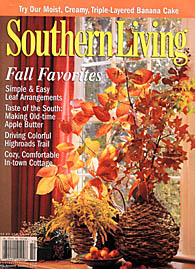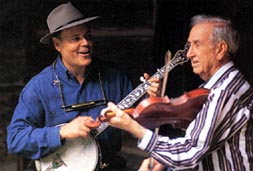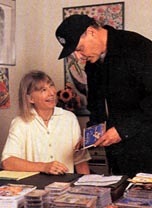Southerners Making a Difference

Southerners Making A Difference
From Southern Living September, 2000
by Sara Askew Orr
David Holt strives to make a difference by perpetuating the music of the mountains.
David Holt has played music in the foothills of the Himalayas and the mountains of Bolivia. He has entertained all across Europe and throughout this country. Regardless of where he plays, though, David performs and informs, delivering old-time mountain music with a message.
He holds that he’s making a difference by “being someone out there performing, playing the old style of music. It really has to be carried on from one generation to the next.”
So he plays, learns, and listens to those who came before, then packages music for the ears—and souls—of modern-day listeners. The connection works in a timeless fashion. “Traditional music has so much power because it is written from the heart and not for profit,” says David. “It has been hand-rubbed by many generations, and it’s distilled into these incredible little nuggets.
“I think people anywhere in the world respond to that because it’s so deep and natural,” he explains, taking a rare moment to relax in the mountain-top home near Asheville, North Carolina, which he shares with Ginny Callaway, his wife of 25 years.
GOING TO THE SOURCE
David’s passion for old-time mountain music began when, as a college student in California in the late 1960s, the Texas native attended a concert by banjoist Ralph Stanley. He fell in love with the sound, then followed Stanley’s suggestion to explore the Southern mountains, the source of the musical style.
“I wasn’t the kind of guy that liked to learn music from books. I wanted to visit the people. So I came here with a friend. We had an old ’52 Chevy truck, his dog, and our instruments. We traveled all around the mountains, all summer long, visiting festivals and musicians,” David recalls, thinking of that first trip in 1969. There was more than music in the mountains.
He discovered a way of life alive with traditions he feared would be lost. “A lot of those folks are now gone. They were all fantastic musicians and were very friendly,” he recounts. “I had a wonderful time finding them. Not only watching how they played and getting ideas, but also just learning about the culture and mountain ways.”

David performs with Ralph Blizzard, one of the premier old-time fiddlers.
Those ways, and their songs, flowed from Scottish, English, Irish, and African American roots, coming together in the Appalachian Mountains. “I really look at these people as coming at the end of the pioneer era. They were very close to the land, and their music was that way too,” David says, flipping through an album of photographs from that long-ago summer. After an Asheville reporter wrote an article about David’s work in music preservation, calls began to flood in, and David added performer to his list of credentials. “A young man’s dream turned into a lifelong pursuit, that’s what it came down to,” he admits with a smile. Then, after starting an Appalachian Music Program at Warren Wilson College in Asheville, David found he could make a living and perform on the side. Gradually his talents expanded to full- time storyteller, musician, historian, and entertainer, all of it with a mind to pre- serving the culture he so cherishes.
“I do what I do because I really love it. I think it is important that the next generation hear this music as well. Hopefully some of those people will be inspired to carry it on. There needs to be some who get the fire like I got the fire when I was 20,” he says enthusiastically.
RHYTHM OF HIS LIFE
David comes from a line of doctors, lawyers, and engineers; no musicians. Yet he admits to a deeper source for his inspiration, showing a photo of his father playing “bones,” two pieces of wood that resemble bone.

David and his wife, Ginny, share the day-to-day business of life from their home near Asheville, North Carolina.
”These bones were carved by my great-great-grandfather during the Civil War,” he says, pulling them out and beginning to play with a rhythmic beat, “He took them on a move from North Carolina to Texas in 1868. The bones are something of traditional music in the family, but it wasn’t like we were a traditional music family.”
At least, not until now. David thinks that this little bit of family history perked his ears up for things traditional. “Music is almost like catching a cold, except it’s a positive kind of disease. It gets hold of you and it stays with you and you have to pursue it,” he says.
His only training while growing up in Garland, Texas, was on drums. He learned the others (banjo, harmonica, steel guitar) the natural way. “This music is played by ear and is passed on by ear. I can hear a fiddle tune and can almost instantaneously play it on the banjo,” David explains.
He also plays from deep in the heart, a heart that has experienced pain as well as happiness. Ten years ago the Holts lost their only daughter in an automobile accident. Sara was 10; son Zeb was 13. David understands the pain his son faced since he, too, lost his only sister when he was a young boy. He survived the two traumatic events by finding comfort in family and in music.
Reflecting, he observes, “Music is like a meditation. I think it is wisdom embodied in a tune that you can’t say. If you could say it, it would be said. But it can’t be said, so it is played.”
ONE-MAN SHOW
So David plays on. As a crusader for old-time mountain music, he makes each concert a special venue for sharing what he’s learned. He intersperses songs with the Southern storytelling tradition. “I try to put the concert in context. I bring big blowups of these pictures,” he says gesturing to his photo album. “I try to have people understand where the music is from. It’s really important for me to honor these people.” He mostly performs solo; sometimes Zeb accompanies him on bass.
“This is living music. It has been passed down and keeps changing slightly all the time. Everybody adds his own personal energy to it. It can only be living if someone is playing it,” he says.
LIVING IN HARMONY
David boasts one Grammy and four Grammy nominations. He also hosts Folkways on North Carolina Public Television and Riverwalk on Public Radio. And he continues to maintain a busy concert schedule.
The drive to achieve always comes back to making that difference. “I feel like this is a never-ending pursuit. I have literally hundreds of songs and tunes I want to learn to perform,” he says. “I feel very blessed that I’ll never get the job done; it will never be finished.”
